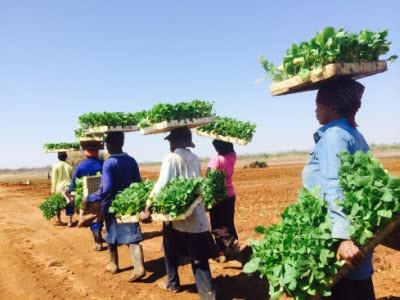
It has been ages since you could light up on a flight, but there is a chance tobacco could become an aviation fuel of the future. Boeing and South African Airways (SAA) have announced that they are close to processing the first crop of tobacco plants for biofuel production. This pilot project, which both companies have publicly acknowledged for over a year, promises so much it almost sounds too good to be true.
This time the feedstock is Solaris, a nicotine-free tobacco plant developed and patented by the Italian biotech firm Sunchem. Instead of providing leaves for cigarette production, the Solaris plant offers flowers and seeds from which oil can be extracted for fuel production. Solaris is not genetically modified, it can grow on lands inhospitable to food crops, and its by-products are high in protein and can be used for animal protein. Its promoters say it will allow tobacco farmers to continue their lives’ work while supporting the national campaign to reduce smoking in South Africa.
Amsterdam-based SkyNRG will develop the test fuel. According to the company, 123 acres (50 hectares) of the Solaris tobacco will be available for harvest next year, with a test flight on SAA to be scheduled when feasible. Along with its other partners, SkyNRG is bullish about this tobacco plant as a future feedstock, promising thousands of jobs, new skills and technologies, energy security for South Africa, and reduced carbon emissions. So, is this really a renewable jet fuel for the future?
Clearly the aviation industry is making progress on biofuel technology. Airlines are under more pressure to reduce their carbon emissions, which is hardly an easy task considering how energy-intensive it is to haul passengers around the world. While airplanes and airlines keep improving with more carbon fiber in planes’ construction, better design and therefore increased energy efficiency, calling any airline “green” or “sustainable” now is a stretch. Several alternatives have been suggested to conventional fossil fuels. For example, garbage has been touted as feedstock for jet fuel, as well as algae and sugarcane. KLM has gone further than most airlines with its weekly transatlantic flights using a blend of kerosene and recycled cooking oil. Finally, it is important to remember these biofuels are blended with jet fuel — often a 40-60 biofuel-conventional blend, sometimes 50-50, but often much less.
The challenge for Boeing, SAA and their partners will be scalability. Assuming tobacco fuel takes off, can farmers really grow enough tobacco to help slowly wean the airline off fossil fuels? The biofuels industry also faces challenges from distribution and cost: Witness the promise of cassava as a cookstove in nearby Mozambique, only for the ambitious project to get cancelled two years later. Nevertheless, projects such as this tobacco-for-fuel venture have their purpose: continued innovation and experimentation that can help improve energy security while hedging against future climate change risks.
Image credit: Cone Communications
After a year in the Middle East and Latin America, Leon Kaye is based in California again. Follow him on Instagram and Twitter. Other thoughts of his are on his site, greengopost.com.

Leon Kaye has written for 3p since 2010 and become executive editor in 2018. His previous work includes writing for the Guardian as well as other online and print publications. In addition, he's worked in sales executive roles within technology and financial research companies, as well as for a public relations firm, for which he consulted with one of the globe’s leading sustainability initiatives. Currently living in Central California, he’s traveled to 70-plus countries and has lived and worked in South Korea, the United Arab Emirates and Uruguay.
Leon’s an alum of Fresno State, the University of Maryland, Baltimore County and the University of Southern California's Marshall Business School. He enjoys traveling abroad as well as exploring California’s Central Coast and the Sierra Nevadas.














